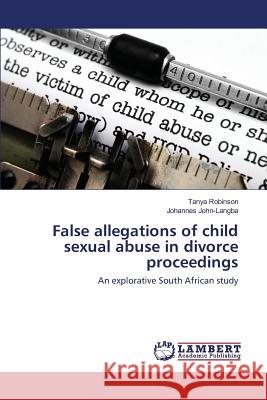False allegations of child sexual abuse in divorce proceedings » książka
False allegations of child sexual abuse in divorce proceedings
ISBN-13: 9783659831041 / Angielski / Miękka / 2016 / 320 str.
This book develops a theoretical understanding of the phenomenon of false child sexual abuse allegations during divorce and custody proceedings. Utilising general systems theory, the theory of planned behaviour and crisis theory, she explores factors contributing to unfounded child sexual abuse allegations and identifies the archetypes of parents making such allegations. Dr Robinson also examines the psychosocial impacts of false child sexual abuse allegations on families, and the meanings accused parents give to the experience. Her results indicate that falsely accused parents present with agony, acute trauma, emotional distress, depression, suicidal ideations and utter dismay. This book highlights the adverse effects of this phenomenon on families. It is ground-breaking in identifying gaps in South African child-welfare policies and legislation needed to address the problem and in suggesting the need to develop evidence-based capacity building initiatives about the problem, specifically targeted at mental health and child-welfare professionals.
This book develops a theoretical understanding of the phenomenon of false child sexual abuse allegations during divorce and custody proceedings. Utilising general systems theory, the theory of planned behaviour and crisis theory, she explores factors contributing to unfounded child sexual abuse allegations and identifies the archetypes of parents making such allegations. Dr Robinson also examines the psychosocial impacts of false child sexual abuse allegations on families, and the meanings accused parents give to the experience. Her results indicate that falsely accused parents present with agony, acute trauma, emotional distress, depression, suicidal ideations and utter dismay. This book highlights the adverse effects of this phenomenon on families. It is ground-breaking in identifying gaps in South African child-welfare policies and legislation needed to address the problem and in suggesting the need to develop evidence-based capacity building initiatives about the problem, specifically targeted at mental health and child-welfare professionals.











